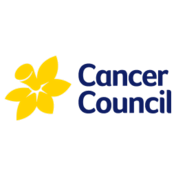Cancer Council

Better Health Partner and Prevention Partner
Working together to promote prevention of chronic disease risk and improve health equity for people facing barriers to better health in cancer prevention, treatment and management.
We currently support Cancer Council as a:
Better Health Partner: 2025 - 2028
Prevention Partner: 2023 - 2026

Better Health Partner
About the organisation
Cancer Council is Australia's leading cancer charity and works across every area of cancer, providing support, investing in research and saving lives. This includes:
Reducing people’s risk of cancer by supporting them to lead healthy lifestyles through cancer prevention programs.
Supporting people affected by cancer from the point of diagnosis through to treatment and survivorship
Advocating for government action to reduce the public’s risk of cancer.
As part of our partnership we're supporting Cancer Council's work to advance health equity.
The project: FOCUS - Facilitating Opportunities for Community Understanding of Screening
We’re continuing our partnership with Cancer Council NSW to empower underserved communities to increase participation in National Cancer Screening Programs.
Over three years this project will deliver interventions across NSW to increase capability, opportunity and motivation of community to participate in the National Bowel Cancer Screening Program, the National Cervical Screening Program, BreastScreen NSW and the National Lung Cancer Screening Program.
Through our partnership these interventions will focus on groups disproportionately affected by cancer, including people from culturally diverse backgrounds, First Nations peoples, people with disability and those in rural and remote communities.
The interventions will be supported and championed by developing sustainable partnerships with local health and community organisations, as well as through tailored cancer screening information resources.
Why it matters
Cancer screening is one of the most effective ways to detect early signs of cancer. When cancer or the conditions that can cause cancer are found early, the chances of successful treatment are much higher.
People from culturally diverse backgrounds, First Nations peoples, people with disability and those in rural and remote communities are disproportionately affected by cancer and have low participation rates across all national screening programs. These communities can face additional barriers to screening.
Our shared goal with Cancer Council NSW is to improve health equity by addressing barriers such as a lack of culturally safe services, inadequate access to culturally appropriate information, communication and literacy barriers, stigma, and difficulties navigating our healthcare system.
Prevention Partner
Cancer Council NSW is developing a new national, online platform that will offer young people information, support and evidence-based services to quit vaping.
The issue
Vaping has dramatically increased in recent years among young Australians, with a growing number of young people experiencing nicotine addiction and seeking support to quit vaping
The evidence for the risks associated with vaping are now clear, including addiction, poisoning, acute nicotine toxicity, lung injury, indoor air pollution and dual use with cigarette smoking, increasing the risk of cardiovascular disease and lung disorders. Cancer Council's Generation Vape research has found that 1 in 3 teenagers have vaped and 80% found access to vapes easy
Currently there are no support services tailored to young people in Australia to help them quit vaping. The number of young people, parents, education providers, and community youth organisations looking for appropriate information and support for vaping cessation is growing.
The project: Online vaping cessation service
Over the coming three years this partnership will address a current public health gap by developing a new national, online platform to help young people aged 14-24 years quit vaping.
Cancer Council NSW aims to reverse the trends in uptake and use of vaping in Australia by scoping, developing and evaluating a national, online platform that will offer young people information, support and evidence-based services to quit vaping.
The platform will also feature tailored information available for parents, carers and health professionals to support young people.
The impact
The platform will have the potential to support population-level changes in reversing trends in uptake and reduce use of tobacco and vaping products in Australia. Its national reach will help prevent vaping uptake and help more young people to stop using vaping products.
Past projects with Cancer Council
Over the years, we have partnered with Cancer Council in NSW, VIC and QLD on different projects, all aimed around preventing cancer.

Looking to learn more about Cancer Council?
Check out Cancer Council's website to find out more.